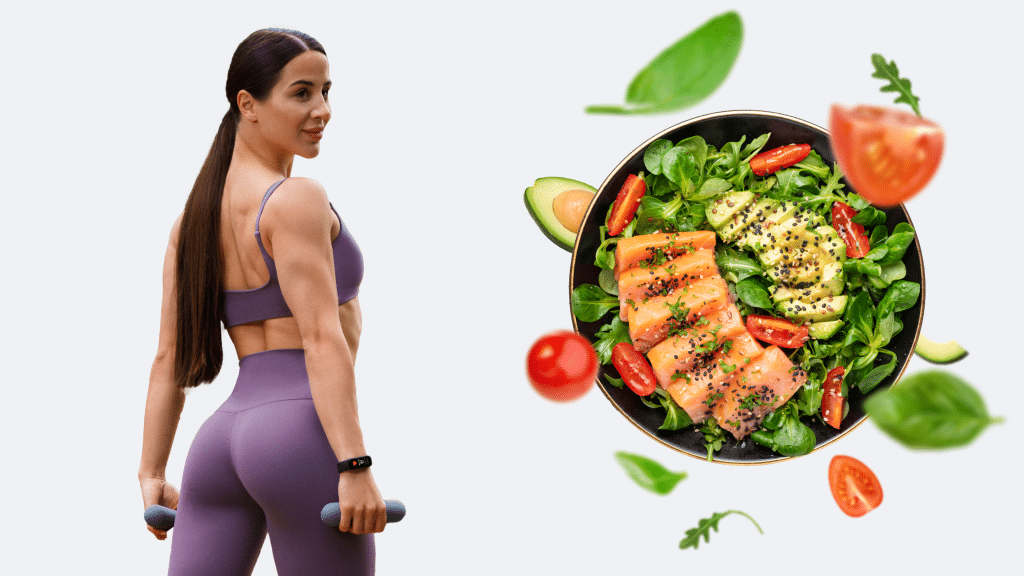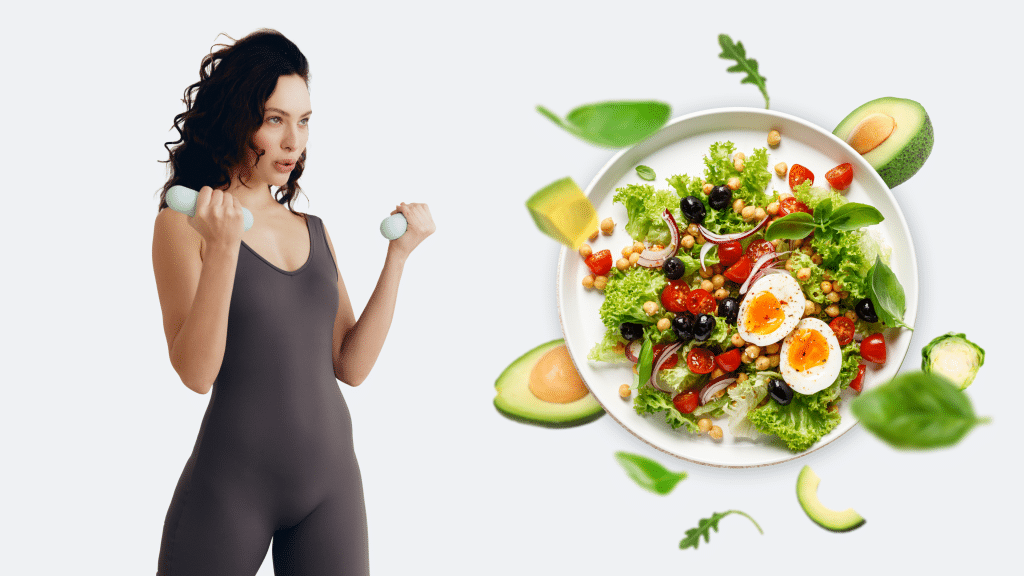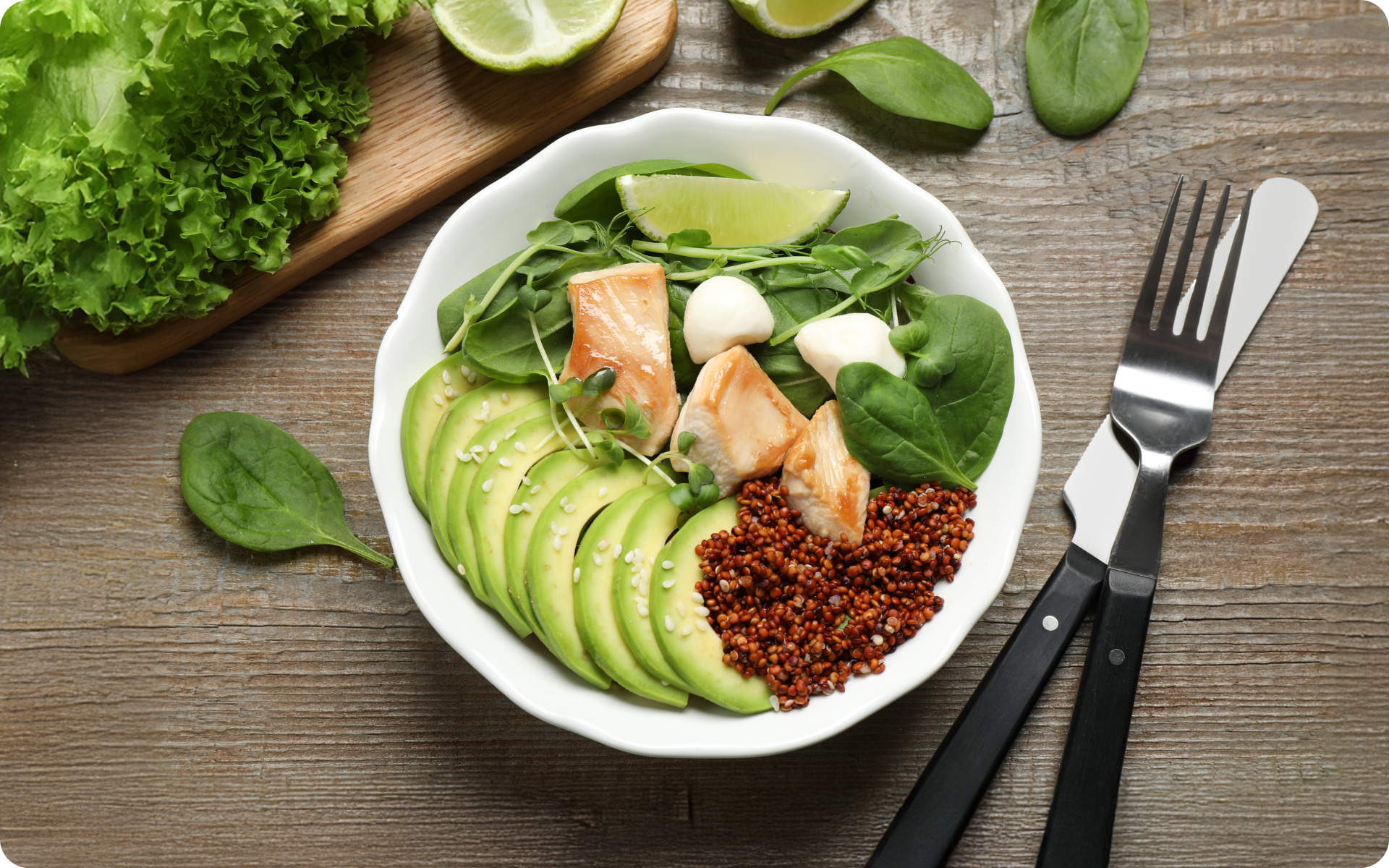Nutrition is fundamental for maintaining a healthy and balanced body, especially when supporting an active lifestyle. For those who lead such a life, nutrition is more than just fuel; it’s a tool to optimize performance. Focusing on quality proteins and an adequate distribution of macronutrients can significantly affect how you feel and perform. Choosing foods that meet energy needs and promote health and well-being is essential to maximize physical and mental potential.
This article will explore how a 2500-calorie meal plan high in protein can help you achieve your health and fitness goals. We will share examples of nutritious foods and answer frequently asked questions about how this diet can influence muscle gain and weight loss. Discover how to integrate the meal plan into your daily routine to reach your personal goals effectively.
What Is a 2500 Calorie Meal Plan High Protein?
A 2500-calorie high-protein meal plan is a structured strategy for organizing your daily meals, ensuring you consume 2500 calories with a particular emphasis on protein-rich foods.
A 2500 calorie meal plan high protein could be a good strategy for those looking to enhance muscle mass, boost athletic performance, or maintain a healthy lifestyle.
Calories are the energy we derive from food and are vital for daily bodily functions.
However, individual caloric needs can vary based on age, gender, weight, height, and activity level (1). An effective 2500 calorie meal plan high protein might be ideal for those with moderate activity levels, like regular exercisers.
This approach isn’t just about counting calories; it’s about ensuring they come from nutritious and diverse sources to provide essential nutrients. Proteins could be crucial in this plan, aiding muscle repair and growth, especially after intense workouts. They also help maintain satiety for more extended periods, which could aid in weight management by reducing cravings and the need for frequent snacking (2).
One of the potential benefits of a high-protein plan is its positive impact on metabolism. Consuming proteins might increase your metabolic rate due to the thermic effect of food, meaning the body burns more calories digesting proteins than fats and carbohydrates. This extra calorie burn due to protein digestion maximizes total daily energy expenditure and improves overall energy balance (3).
While many high-protein meal plans are also low in carbohydrates, not all 2500-calorie high-protein meal plans will be low-carb (4).
The composition of a meal plan can vary based on individual dietary goals and preferences.
For example:
- 2500 calorie meal plan high protein low carb: These often focus on reducing carbohydrate intake while increasing protein, which can benefit weight loss and muscle maintenance. It also comes with the risk of nutrient deficiencies and low energy due to fewer carbs (5).
- 2500 calorie meal plan high protein balanced carb: These include a moderate amount of carbohydrates, often from whole grains, fruits, and vegetables, to provide a balanced diet. The focus is increasing protein while giving your body the fuel it needs through carbs (6).
A low-carb and high-protein diet can be good if it aligns with your health goals and dietary preferences. It’s crucial to ensure you’re still getting a balanced intake of nutrients and to consult with a healthcare provider or dietitian to tailor the plan to your specific needs.
Whether you’re a workout beast or just a beginner making your first foray into the world of fitness and dieting – BetterMe has a lot to offer to both newbies and experts! Install the app and experience the versatility first-hand!
How Much Weight Will I Lose if I Eat 2500 Calories a Day?
A 2500-calorie diet plan for weight loss could be an effective option for some people, especially if they have moderate physical activity.
In these cases, the daily energy expenditure is high enough that even with a caloric intake of 2500, you can maintain a caloric deficit, allowing for weight loss.
From a scientific perspective, researchers and dietitians relate weight loss to the principle of caloric deficit.
A calorie deficit means consuming fewer calories than your body burns to lose weight. To calculate how much weight you could lose, you first need to know your basal metabolic rate (BMR), which is the number of calories your body needs to maintain basic functions at rest. Then, you should consider your daily physical activity level to determine your total daily energy expenditure (TDEE).
If your TDEE is greater than 2500 calories, you would be in a caloric deficit, which could result in weight loss. Generally, a deficit of 500 to 1000 calories per day can lead to a weight loss of approximately 0.5 to 1 kilogram per week. However, this estimate can vary depending on factors such as body composition, metabolism, and adherence to the diet plan (7) (8) (9).
It’s important to remember that it’s not just about the number of calories but also the quality of the foods you consume.
Keep reading because we are moving on to some examples of foods you can include in this plan.
Read more: 1,900-Calorie Meal Plan High-Protein: Your Diet for Weight Loss
Can I Build Muscle With 2500 Calories?
Gaining muscle mass is possible on a 2500 calorie meal plan for building muscle. However, your results can vary based on metabolism, physical activity level, body composition, and specific training goals.
When aiming to gain muscle, it’s about the calorie count and the quality of nutrients.
Here are some considerations to add to any muscle gaining meal plans you try (10):
- Adequate Protein: Ensuring sufficient protein intake is crucial for muscle repair and growth.
- Strength Training: Resistance or strength training is essential to stimulate muscle growth. Following a well-structured program that progressively challenges your muscles is necessary.
- Macronutrient Balance: Besides proteins, including complex carbohydrates and healthy fats in your diet provides energy and supports muscle recovery.
- Rest and Recovery: Adequate rest and recovery are vital for muscle growth. Ensure you get enough sleep and allow muscles to recover between training sessions.
While a 2500-calorie diet plan for muscle development might be sufficient for some, others may require more or fewer calories to achieve their muscle-building goals.
We recommend consulting with a nutritionist or personal trainer to help tailor a plan to your needs.
How Much Protein Do I Need For a 2500 Calorie Diet?
Determining how much protein you need in a 2500-calorie diet requires considering several personal factors, such as your physical activity level, health goals, and body composition.
Dieticians recommend 10% to 35% of your daily calories come from protein.
Since one gram of protein provides 4 calories, a person consuming a 2500-calorie diet might need between 62.5 and 218.75 grams of protein per day, depending on their specific needs (11).
Protein sources include animal-based foods, like:
- Meat
- Fish
- Eggs
- Dairy products
- Plant-based sources (More on this below!)
If you’re picky with food, it’s important to find options that are both nutritious and appealing to your taste.
Try these high protein foods for picky eaters and add your favorites to your grocery list:
- Protein bars
- Fortified high-protein cereals
- Greek yogurt (plain, sweetened with fruit, or lower sugar content)
- Cheese with whole-grain crackers for an extra boost of protein and fiber.
- Banana or apple slices with peanut butter
- Hummus with veggie sticks or crackers
- Smoothies made with milk, yogurt, and fruit, with the option to add nut butter for extra protein.
- Whole wheat toast and nut butter (or a PB&J)
- Chicken noodle soup
- Chicken and cheese quesadillas
These alternatives are not only nutritious but can also be very satisfying (12).
Distribute your protein intake throughout the day and choose high-quality sources. Doing so will help ensure a balanced diet and meet your nutritional needs.
Read more: Calorie Deficit Diet Plan To Lose Weight
What Food Can I Eat For 2500 Calories a Day?
When planning a 2500-calorie diet, it’s crucial to choose foods that not only meet your energy needs but are also nutritious. For a 2500 calorie meal plan high protein vegetarian, you can substitute animal proteins for plant-based proteins to get similar results (13).
Here is how you can group foods to achieve a balanced diet:
1. Lean Proteins
- Lean meats like chicken and turkey.
- Omega-3-rich fish like salmon and trout.
- Plant-based sources such as legumes, tofu, and tempeh.
2. Healthy Fats
- Avocados and olives.
- Nuts and seeds (Plant-based sources)
- Healthy oils like olive oils.
3. Complex Carbohydrates
- Sweet potatoes and potatoes.
- Whole grains like brown rice, quinoa, oats, and buckwheat.
- Whole grain breads and pastas.
4. Fruits and Vegetables
- Leafy greens like spinach and kale.
- A variety of fruits like apples, berries, and citrus.
- Colorful vegetables like carrots, peppers, and broccoli.
5. Dairy or Alternatives
- Greek yogurt, milk, cottage cheese
- Plant-based alternatives like almond or soy milk.
7-Day Protein Diet Plan for Weight Loss:
Use this 7-day diet plan as a reference when you want to start a high-protein 2500 calorie meal plan for weight loss:
Day 1:
- Breakfast: Greek yogurt with berries and almonds (500 calories)
- Lunch: Grilled chicken salad with mixed greens and avocado (700 calories)
- Dinner: Baked salmon with quinoa and steamed broccoli (800 calories)
- Snacks: Protein shake and a handful of nuts (500 calories)
Day 2:
- Breakfast: Scrambled eggs with spinach and tomatoes (500 calories)
- Lunch: Turkey and avocado wrap with a side of fruit (700 calories)
- Dinner: Beef stir-fry with vegetables and brown rice (800 calories)
- Snacks: Cottage cheese with pineapple and a protein bar (500 calories)
Day 3:
- Breakfast: Cottage cheese with pineapple and a slice of whole-grain toast (500 calories)
- Lunch: Tuna salad with mixed greens and a whole-grain roll (700 calories)
- Dinner: Grilled shrimp with brown rice and asparagus (800 calories)
- Snacks: Greek yogurt with honey and almonds (500 calories)
Day 4:
- Breakfast: Protein smoothie with banana and peanut butter (500 calories)
- Lunch: Chicken and vegetable soup with a side salad (700 calories)
- Dinner: Pork chops with sweet potato and green beans (800 calories)
- Snacks: Hard-boiled eggs and a piece of fruit (500 calories)
Day 5:
- Breakfast: Omelette with mushrooms and bell peppers (500 calories)
- Lunch: Quinoa salad with chickpeas, feta, and a side of fruit (700 calories)
- Dinner: Baked cod with wild rice and spinach (800 calories)
- Snacks: Protein shake and a handful of nuts (500 calories)
Day 6:
- Breakfast: Chia pudding with mixed berries (500 calories)
- Lunch: Grilled chicken and avocado salad with a whole-grain roll (700 calories)
- Dinner: Turkey meatballs with zucchini noodles (800 calories)
- Snacks: Greek yogurt with honey and almonds (500 calories)
Day 7:
- Breakfast: Protein pancakes with fresh fruit (500 calories)
- Lunch: Salmon and quinoa bowl with a side salad (700 calories)
- Dinner: Beef and vegetable kebabs with brown rice (800 calories)
- Snacks: Cottage cheese with pineapple and a protein bar (500 calories)
This plan ensures you get a balanced protein, carbs, and fats intake while staying within your 2500 calorie goal (14)(15).
Planning your meals might feel overwhelming, but with some organization, you can enjoy a varied and delicious diet that meets your nutritional goals.
To get you started with some more ideas, here’s an example of a high-protein, 2500-calorie meal plan for a day:
Breakfast: Scrambled Eggs with Blueberry Oatmeal
Ingredients:
- 2 whole eggs
- 2 egg whites
- 1/2 cup cooked oatmeal
- 1/2 cup fresh blueberries
- 2 tablespoons mixed seeds (like chia, flax, or pumpkin seeds)
Total:
Calories: 600
Fat: 20 g
Carbs: 60 g
Protein: 35 g
Lunch: Grilled Chicken with Broccoli and Quinoa
Ingredients:
- 6 oz. grilled chicken breast
- 1 cup of chopped, steamed broccoli
- 1 cup of cooked quinoa
- 1 tablespoon extra-virgin olive oil
Total:
Calories: 550
Fat: 18 g
Carbs: 45 g
Protein: 65 g
The BetterMe: Health Coaching app will provide you with a host of fat-frying fitness routines that’ll scare the extra pounds away and turn your body into a masterpiece! Get your life moving in the right direction with BetterMe!
Dinner: Vegetable Frittata
Ingredients:
- 7 whole eggs
- 1 cup of egg whites
- 2 cups of spinach
- 1 cup of mushrooms, sliced
- 1/2 cup of red bell peppers, chopped
- 1/2 cup of feta cheese
- 1 1/2 tablespoons of olive oil
Total:
Calories: 750
Fat: 48 g
Carbs: 28 g
Protein: 67 g
Snack: Greek Yogurt with Nuts and Honey
Ingredients:
- 1 cup of plain Greek yogurt
- 1/2 cup of mixed nuts
- 1 tablespoon of honey
Total:
Calories: 600
Fat: 30 g
Carbs: 50 g
Protein: 34 g
Please use these meal plans as guides, and remember you can adjust them to your preferences and personal needs. It’s always advisable to consult with a healthcare professional for personalized guidance.
For individuals with moderate physical activity, 3500 calories might be excessive and lead to fat storage rather than muscle gain. This caloric level is generally more suitable for athletes or highly active people. Proper adjustment could help achieve desired fitness goals. The 50/30/20 diet has a daily intake of 50% carbohydrates, 30% fats, and 20% proteins for nutritional balance. Many use it to maintain a balanced diet, promoting sustained energy and overall health. It could be a good option for those looking for a simple meal structure. For some, 2500 calories might be a balanced intake, especially with regular exercise. It might be too much for others, depending on basal metabolic rate and their daily activity level. Constant caloric excess could eventually lead to weight gain. Eating 4000 calories every day is typically excessive for most unless you’re an athlete with high energy needs. This high caloric intake could lead to rapid weight gain. Balancing calories consumed and expended is very important to avoid undesired effects. Note: It’s essential to tailor the diet to specific personal needs and goals, considering factors like age, gender, activity level, and metabolism.Frequently Asked Questions
Are 3500 calories too much to bulk?
What is the 50 30 20 diet?
Is 2500 calories overeating?
What if I eat 4000 calories a day?
The Bottom Line
A 2500-calorie high-protein meal plan could be an excellent way to support your health and fitness goals. This approach focuses not just on the number of calories, but on the quality of the foods you consume. Including lean proteins, healthy fats, and complex carbohydrates might help your body repair and build muscle, stay fuller for longer, and boost your metabolism.
This diet could be ideal for those looking to increase muscle mass or enhance physical performance. The key is to tailor the plan to your needs, considering your activity level and specific goals. With the right food choices, you can enjoy a balanced diet that helps you feel and perform better every day.
DISCLAIMER:
This article is intended for general informational purposes only and does not serve to address individual circumstances. It is not a substitute for professional advice or help and should not be relied on for making any kind of decision-making. Any action taken as a direct or indirect result of the information in this article is entirely at your own risk and is your sole responsibility.
BetterMe, its content staff, and its medical advisors accept no responsibility for inaccuracies, errors, misstatements, inconsistencies, or omissions and specifically disclaim any liability, loss or risk, personal, professional or otherwise, which may be incurred as a consequence, directly or indirectly, of the use and/or application of any content.
You should always seek the advice of your physician or other qualified health provider with any questions you may have regarding a medical condition or your specific situation. Never disregard professional medical advice or delay seeking it because of BetterMe content. If you suspect or think you may have a medical emergency, call your doctor.
SOURCES:
- Calories (2022, pubmed.ncbi.nlm.nih.gov)
- Protein (2018, pubmed.ncbi.nlm.nih.gov)
- A high-protein total diet replacement increases energy expenditure and leads to negative fat balance in healthy, normal-weight adults (2020, pubmed.ncbi.nlm.nih.gov)
- A 2,000-Calorie Diet: Food Lists and Meal Plan (2023, healthline.com)
- The Truth About a High-Protein, Low-Carb Diet – Consumer Reports
- Nutrition and healthy eating (2022, mayoclinic.org)
- Optimal Diet Strategies for Weight Loss and Weight Loss Maintenance (2020, pubmed.ncbi.nlm.nih.gov)
- How to safely and effectively create a calorie deficit for weight loss (2023, medicalnewstoday.com)
- How Many Calories Should You Eat Per Day to Lose Weight? (2024, healthline.com)
- How do muscles grow? (n.d., unm.edu)
- Protein in the diet (2023, medlineplus.gov)
- 25 High Protein Foods For Picky Eaters (2023, readysetgrownutrition.com)
- Plant vs. Animal Protein: Which Is Better for Building Muscle, Weight Loss (2023, healthline.com)
- 2500 Calorie High Protein Meal Plan for Muscle Building and Weight Gain (n.d., eatthismuch.com)
- 7-Day High-Protein Meal Plan to Have More Energy, Created by a Dietitian (2024, eatingwell.com)











